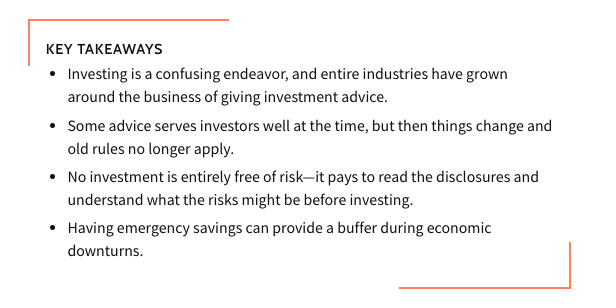
Lisa Smith
Feb. 22, 2020
Investing is a confusing endeavor for many people, so much so that an entire industry has grown up around giving advice to those in need. Sometimes that advice works out and sometimes it doesn't.

Let's look at a few timeworn concepts that don't always work out so well for investors despite the industry's recommendations. There are few absolutes in the world of investing, but a few Wall Street mantras have repeated for a long time. Here is some of the best and the worst investing advice you've probably heard.

Advice to Reconsider
- Diversify: Diversification has long been held up as a way to protect your portfolio. The theory holds that when some investments lose value, others will gain. For example, investing in emerging markets and small-cap stocks instead of just blue chips is touted as a way to protect your portfolio. A global recession can override that theory.
- Buy Term and Invest the Rest: Whole life insurance policies have been panned for decades. Critics cite the low rate of return they provide and highlight how investing in the stock market can provide significantly greater gains. While it is true that whole life policies pay low rates of interest, any positive rate of return beats the negative 40% delivered by the last bear market.
- Money Markets Are as Safe as Cash: Money market accounts have been marketed as "safe" for so long that 401(k) plans often list them as "cash." However, they are only as safe as the institution that holds them, and banks do go out of business, especially regional banks. Your assets could be tied up while regulators sort out the funds.
- Don't Pay Off Your Mortgage: The logic stated that investing your money would generate a greater return than paying off your mortgage. When bear markets hit, this logic goes out the window. Sure, real estate values can fall too, but even in a declining real estate market, the bank doesn't foreclose on a home that is paid off.
- Real Estate Is a Safe Investment: The idea that your house would always increase in value seemed like a safe premise. Multiple years of hefty price declines after the 2007-2008 global financial crisis debunked this myth.
- Holding Many Stocks Provides Diversification: This timeworn gem fails to hold up when a global recession pushes nearly all stock markets down. Yes, there are exceptions, as a few markets always manage to stay positive, but not many investors manage to pick the right markets in advance.
- Fixed-Rate Annuities Are a Bad Investment: Fixed-rate annuities have been heavily criticized for their hefty fees and complex rules. None of those factors seemed to bother annuity investors who enjoy positive returns throughout even the worst bear markets.
Is It Really Bad Advice?
So are all of those common bits of advice simply bad? Perhaps not at the time they were given, but none of them work out too well for investors expecting to retire when a major bear market hits and the global economy melts down on all fronts. Keep in mind that any idea is a good one until it doesn't work.

On the other hand, if you are looking for timeless gems like the little black dress that never goes out of style, consider these seven items.
- Have a Plan: The old cliche is true. Nobody plans to fail, but many fail to plan. Having a comprehensive financial plan in place, understanding your goals, and proactively managing your investments are never bad ideas.
- Have a Cash Cushion: The emergency fund is always a classic. Like an insurance policy, you hope you never need to use it, but if you do, it is there when you need it.
- Live Below Your Means: If you make a habit of spending less than you earn, it will be much easier to survive if your earnings decline. Losing your job is never fun, but losing your house and car make the situation significantly worse.
- Nothing Is Risk-Free: Even money market funds can be problematic. Don't put money in an investment, even if it is being sold to you by your best friend, with the idea that there is no way you can lose money. Bernie Madoff's friends learned that lesson the hard way.
- Nothing Rises Forever: From the S&P 500 to real estate prices, this little truism has proven itself over and over again. If there was ever a safe bet, this is it.
- If It Sounds Too Good to Be True, It Is: Hope and greed cause investors to put their faith in the strangest things. Apply common sense before handing over your money.
- Read the Disclosures: This may be the least-exciting concept, but remember these phrases from every mutual fund prospectus issued: "Past performance is not indicative of future results; this product is not insured by the Federal Deposit Insurance Corporation; this product is not a deposit or other obligation of, or guaranteed by, the bank." And last but not least: "This product is subject to investment risks, including possible loss of the principal amount invested."
The Bottom Line
Not all advice is good advice, but it isn't all bad either. Learn as much as you can and make the decision for yourself. In the end, you'll find what advice works best for you and your investing style.



